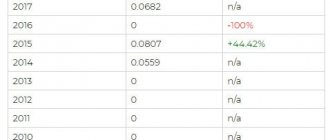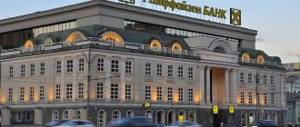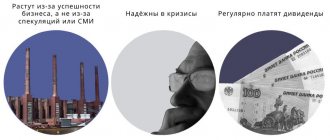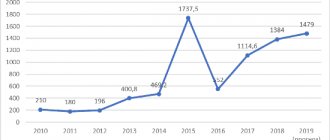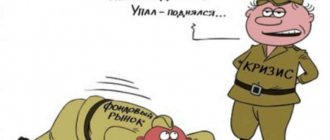How are things going at the bank?
Many banks suffered due to the financial crisis. They lost their income from loans, and in some cases even lost their funds due to debtors mired in debt. Mosoblbank was no exception, and due to a serious outflow of credit funds, its financial condition was shaken. For some period, the bank deliberately froze all issuance of deposits, which plunged individuals into serious panic, and especially pensioners, who are already one of the least protected categories of the population.
This can only be justified by the financial ignorance and illiteracy of the population. After all, as you know, banks work practically on borrowed money. That is, people give their funds at interest to the bank, and it, in turn, issues loans, making money on the difference in interest rates. If loans are not repaid, then how can a bank immediately return all deposits to its customers?
As you know, the state is implementing a national deposit insurance program, and Mosoblbank is taking part in this. That is, the average depositor, whose deposit amount does not exceed 1.4 million rubles, will definitely be able to get his money back, even if the bank goes bankrupt. But investors who had more significant deposits would, of course, lose part of their savings.
The whole problem began due to a serious fall in the ruble, and many borrowed funds went out of circulation forever. In order to stay afloat, this fairly large regional bank decided to absorb Inresbank. This gave serious opportunities and stability to the bank.
The latest news reports that today the bank's condition has completely returned to normal. If 1-2 years ago people stood in long queues, filing complaints and demanding the return of their deposits, now the problem has been completely resolved, and the bank has received stable status.
The owners of the bank do not hide from problems and honestly retained negative customer reviews while continuing to work and establish contacts.
After a while, the bank stabilized the situation and satisfied the needs of all panicking clients and returned their deposits to them, continuing to function.
Bank shares with negative capital will be bought back for pennies
SMP Bank of Arkady and Boris Rotenberg will buy out shares from minority shareholders of Mosoblbank, which has been undergoing rehabilitation since 2014. The bank indicates that the buyout will speed up its financial recovery and reduce the costs of convening and holding shareholder meetings. The sanatorium will spend no more than 400 rubles on the entire package, while its stock exchange value is estimated at 110 million rubles. However, Mosoblbank has negative capital, and experts believe that in order to protect investors, its shares should have been removed from exchange trading a long time ago.
Northern Sea Route Bank, which since May 2014 has been the sanator of Mosoblbank and its majority owner (98.3%), in early June submitted a demand to buy out its shares. After completion of the procedure, as noted by Kommersant at SMP Bank, he will remain the sole shareholder of Mosoblbank until their merger. The redemption procedure is carried out in accordance with the provisions of the Law “On Insolvency (Bankruptcy)”, as well as Article 84.8 of the Law “On Joint-Stock Companies”. The register of shareholders closes on July 18.
As Mosoblbank explains, the repurchase of shares from minority shareholders will “reduce costs, including those for convening, preparing and holding general meetings of shareholders, as well as significantly increasing the speed of corporate decision-making.”
As the bank notes, most of the minority shareholders “received their shares as gifts before the start of the financial recovery procedure in 2014.”
“The purpose of this type of gift was to circumvent the previous management of the Central Bank’s regulations on restrictions on attracting public funds into deposits, since the restriction did not apply to the bank’s shareholders. The Bank of Russia subsequently also stopped this scheme,” explained Mosoblbank.
According to the reporting of Mosoblbank, as of May 1, 2021, its capital was negative and amounted to -143.8 billion rubles. At the same time, the bank’s net profit for four months amounted to 1.06 billion rubles. According to the latest approved financial recovery plan, its merger with SMP Bank should occur no later than December 31, 2031. SMP Bank is controlled by Arkady and Boris Rotenberg, who own 49.99% and 43.22% of the shares, respectively. Its capital as of the reporting date was 53.5 billion rubles, and its net profit was 3.2 billion rubles.
An independent appraiser established the value of a 100% stake in Mosoblbank at one ruble, and the repurchase price of one share is significantly lower than one kopeck (1/4507984112 rubles). However, as stated in the redemption request, if the total value of securities owned by one person is less than 1 kopeck, then all of them are redeemed at the price of 1 kopeck. At the same time, at the end of the first quarter, the register of shareholders of Mosoblbank included 38.2 thousand owners of ordinary shares. Over the past year, shares have been traded on the stock exchange in the range of 2–3.5 rubles. In the last days of May, their quotes were about 2.7 rubles. However, over the past two days, shares have been rapidly losing value and by the end of Wednesday dropped to 1.45 rubles. Thus, the current exchange value of the minority shareholders' portfolio is RUB 110 million. The maximum repurchase price for all shares, based on the total number of shareholders, should not exceed 400 rubles.
How Mosoblbank got rid of toxic assets
Shareholders have the opportunity to challenge the terms of the repurchase. A shareholder who does not agree with the repurchase price can engage his appraiser to conduct an independent assessment and apply to the arbitration court with a claim for compensation for losses caused in connection with the improper determination of the price of the repurchased securities, says the adviser to the law firm Egorov, Puginsky, Afanasiev and Partners. Daria Ilyina. “Such a claim can be brought within six months from the day the owner of the securities learned about the debiting of the securities to be redeemed from his personal account (depository account),” she points out. Nevertheless, the filing of such a claim by the owner of securities is not grounds for suspending the repurchase of securities or declaring it invalid, Ms. Ilyina reminds. In practice, before sending a request to repurchase shares, Bank of Russia employees who have a license to carry out valuation activities are involved in checking the valuation.
The correctness of the fact that Mosoblbank shares with negative capital are still traded on the stock exchange is questionable, says Maxim Shein, chief investment strategist at BKS Broker, since this creates a threat and risks for unqualified investors. According to Kommersant’s interlocutor, it would be more logical to raise the issue of delisting earlier.
Olga Sherunkova
Further forecasts
Many people promised Mosoblbank collapse and ruin. But he was able to cope with his problems and today is already attracting new investors, guaranteeing the return of invested funds, and opening new deposit programs with interesting conditions in 2018. Among them: “New Pension” at 7.75% per annum, “Stable”, which has a maximum interest rate of 6.25% and “Personal”, which promises its applicants a profit of 7% per annum.
In addition, the bank did not close loan programs
. Enterprises are actively involved in conducting salary projects. In addition, the bank is actively developing new proposals for opening credit cards and preparing a new deposit program.
Also, information recently appeared that in the near future there are plans to develop and open new branches in Moscow and the region. The bank's owners are trying in every possible way to assure their clients that the bank has fully recovered and is ready to work at full capacity. Today, it has already entered the top ten largest and strongest financial organizations in the capital. And this once again confirms that you should not blindly believe rumors. After all, this way you can ruin even the strongest bank.
Crazy Mosoblbank Details of the largest scam in the banking market
A few hours after Vedomosti published news about the upcoming reorganization of Mosoblbank, the largest after the Bank of Moscow, he offered clients an unusual deposit - “Brave Mosoblbank” with a yield of 10.65% in rubles and 5.5% in foreign currency with daily interest payments. Like the conditions, the name of the deposit was openly mocking - this was the name of the group on the banki.ru forum, in which the head of the analytical department of the BKF bank, Maxim Osadchiy, had been trying for several years to draw public attention to the dubious operations of Mosoblbank.
The hint of impunity was not mere bravado. When it turned out that Mosoblbank is a giant vacuum cleaner that took at least 100 billion rubles from its balance sheet. depositors, having hidden them in exotic projects, the Central Bank (CB) only threw up its hands, the Deposit Insurance Agency (DIA) was “amazed by the scale of the problems,” and law enforcement agencies chose to withdraw themselves. The “Money” columnist looked into where Mosoblbank got its self-confidence from.
Robot vacuum cleaner
For a professional depositor, Mosoblbank was a godsend: interest was paid on time, profitability almost always exceeded 10%, there were branches on every corner, payment of housing and communal services without commission, deposits for pensioners, students, hunters, fishermen - in general, for every taste and color. A cowardly investor would walk a mile away from such a bank, but a professional would not. And there are zero risks: up to 700 thousand rubles. the state will return. These depositors are calm now that, instead of revoking its license, the Central Bank subjected Mosoblbank to reorganization for a record amount after the Bank of Moscow of 117 billion rubles. Investors will save not only their funds, but also interest.
A few years ago, analysts, observing the behavior of Mosoblbank, rolled their eyes and said: “A vacuum cleaner again.” In 2013, according to the RBC rating, it took seventh position in terms of the size of its branch network (585 branches), surpassing even the good old Alfa Bank. In just six months last year, he opened 74 offices, hanging three signs a week. McDonald's (424 restaurants in Russia) and Starbucks (71 coffee shops) would be envious of such expansion. In terms of the volume of consumer loans issued, Mosoblbank did not even make it into the top 50 list (Alfa Bank, for example, is in seventh place).
Even with the naked eye one could see that Mosoblbank, for some purpose, was pumping money out of the market and paying interest to depositors using unknown funds. However, according to the deputy chairman of the Central Bank, Vladimir Safronov, the regulator discovered the scheme by accident. One of the depositors turned out to be a Central Bank employee who noticed that the deposits brought to the bank were withdrawn almost in full the next day, and in other offices and cities.
It later turned out that fictitious cash withdrawals were far from the most creative way to hide deposits from the Central Bank. Every night, a special macro automatically terminated contracts, supposedly at the request of Mosoblbank clients, and then entered into new ones for investments in securities. The funds went first to the accounts of OJSC RFK (at the end of 2013 it owned 97.96% of the shares of Mosoblbank), and then in an unknown direction. Some of the funds were found in the accounts of the Rus equestrian park, the Central Bank and SMP Bank say. Traces of this vigorous activity were also reflected in the company’s financial statements: in 2012 alone, RFK OJSC earned a net profit of as much as 210 billion rubles, which did not bother the Central Bank, the Tax Service, or even the Federal Financial Markets Service, although the main source of this profit was supposedly income related to the conversion of securities in accounting (RUB 197.7 billion).
Experts interviewed by Dengi agree that there is no point in looking for a rational grain in Mosoblbank’s schemes, since its managers were engaged in “artistic creativity”: they kept double-entry bookkeeping and painted for the Central Bank the picture that it wanted to see. Therefore, it is difficult to talk about the legality of such a macro if there were no real operations. “As can be seen from the description, the termination of the deposit and the completion of another transaction was simulated by a computer program,” says Roman Malovitsky, senior lawyer at Egorov, Afanasyev, Puginsky and Partners. “The relationship between the bank and the individual from a legal point of view was still a relationship under a contract contribution. Thus, using the macro, the bank provided false information to the CBR so that the violation of the order would not be obvious to the regulator.” As for the program itself, according to Money, writing it is not difficult, and the price is about 100 thousand rubles.
According to Safronov, Mosoblbank began building schemes after the Central Bank in 2011, sensing something was wrong, introduced restrictions on the bank accepting new deposits from individuals other than shareholders. At the same time, the regulator contacted the Prosecutor General’s Office, but “the first letter did not lead to any results,” says the deputy chairman of the Central Bank. In February 2012, the Department of Internal Affairs for the Southwestern District of Moscow conducted a search in the office of Mosoblbank on Solyanka, but the official reason was different - a criminal case against a bank depositor.
The pressure from the Central Bank seems to have only inflamed talented managers. A few months after the Central Bank’s order, the National Foundation of St. Tryphon, headed by the bank’s main beneficiary Andrzej Malczewski, began distributing Mosoblbank shares with a par value of 40 rubles for free to clients, thus avoiding the Central Bank’s order. Analysts admit that they have not seen such audacity for a long time, and hastened to write down such a “knight’s move” in economics textbooks.
At the end of 2012 - beginning of 2013, says Safronov, the Central Bank again inspected the bank and sent a new letter to the Prosecutor General's Office, at whose request law enforcement agencies nevertheless conducted an inspection. The facts were confirmed, but no criminal case was opened. It is curious that it was at this time that the Bank of Russia’s financial markets service discovered exchange manipulations in the shares of Mosoblbank, RIC LLC and RFK OJSC; all three companies are clients of another Malchevsky bank, Inresbank (also subject to reorganization). Law enforcement agencies are silent now. As the Investigative Committee of the Russian Federation told Denga, as of May 30, investigators had not received materials about Mosoblbank.
According to Maxim Osadchy, Mosoblbank also circumvented the capital adequacy standards of the Central Bank. He did this with the help of so-called gifts - gratuitous contributions from shareholders, without which he would have to show losses. In 2012, the bank went into the red by 15.9 million rubles. even taking into account “gifts” of 0.7 billion rubles, in 2013 it came to almost zero with a meager income of 12.8 million rubles, but shareholder contributions increased to 11.4 billion rubles.
According to the unofficial rating of banking analysts, in 2013 Mosoblbank had no equal in terms of the volume of “gifts”. Immediately after it in the ranking are Leto-Bank (a specialized subsidiary of VTB; 7.8 billion rubles) and Bank Yugra (7.2 billion rubles). Next by a wide margin - starting from 3 billion rubles - were Volkswagen Bank Rus, Sovetsky Bank, Russian Standard, Baltinvestbank, B&N Bank, Svyaznoy Bank and others. Thanks to the “gifts,” Mosoblbank’s H1 capital adequacy ratio jumped from 10-11% (risk zone) to 22.13% by May 1, 2014, which once again misled the Central Bank.
According to Osadchy, increased interest rates were paid to old depositors, most likely, at the expense of new ones, which makes Mosoblbank more similar to MMM than to Master Bank with its black cash register and cash withdrawal. However, it seems that there was an “envelope” here too. According to the Kommersant newspaper, in order not to disclose the double balance, cash was secretly brought into the branches to pay interest. “Apparently, Mosoblbank was entrusted with the functions of working with cash - the so-called unaccounted cash,” Kirill Kabanov, chairman of the National Anti-Corruption Committee, told Dengi. “It was for this purpose that, most likely, attractive programs were created for private clients.”
However, Mosoblbank did not have disproportionately large turnover on cash register accounts 20202 and 20209 (form 101). For comparison, the Dagestan bank Express, which was caught cashing out at the beginning of 2013, exceeded this Central Bank standard by 3-4 times.
According to banker Alexander Lebedev, for cashing out it is not at all necessary to collect such a volume of depositors’ money. “The Central Bank did not allow Mosoblbank to attract new deposits, so they began to use schemes,” he told Dengi. “The usual story: you take client money and put it in your pocket. This is a normal business in Russia.”
In other words, it is very likely that we are dealing with a banal attempt at theft, Lebedev believes, but on a very large scale. The DIA was also surprised by the scale of the scheme. According to representatives of the Central Bank, the regulator decided to land its troops in Mosoblbank only after it, after an ultimatum, was forced to reflect 76 billion rubles on its balance sheet. deposits instead of the drawn 20 billion rubles. They delayed it, they say, because the money could disappear altogether, as happened more than once with the assets of banks whose licenses were revoked. In addition, SMP Bank itself volunteered to sanitize Mosoblbank and was the only one willing, they say in the DIA. Indeed, under the conditions of sanctions, getting a loan for ten years at 0.51% per annum and a ready-made branch network is expensive.
However, this does not mean that professional investors can relax. As SMP Bank told Dengi, the sanator doubts the veracity of the register of Mosoblbank depositors: some of the real names in it have been replaced with fictitious ones, and in order to return the money, the DIA will require additional verification. Moreover, the hole in Mosoblbank’s balance sheet continues to grow (the Central Bank’s initial estimate is 60 billion rubles), they say at SMP Bank: the former owners, among other things, also inflated the value of the collateral.
And yet, where to look for assets withdrawn in such volumes?
Andrzewa Stables
Unlike the ancient Greek king Augeas, businessman Andrzej Malczewski looked after his stables. From early childhood he got used to sitting in the saddle, and when he grew up, he turned his hobby into a source of income. Although in a very sophisticated form.
The son of Pole Ryszard Malczewski (he is now 76 years old and lives in Poland), Andrzej led the Moscow office in the 1990s, but in the early 2000s he transferred it to Astrakhan. In 2004-2006, Malchevsky worked in the State Duma apparatus, where he met Gennady Seleznev, later chairman of the board of directors of Mosoblbank, as well as his chief PR and PR manager.
In banking circles, little is known about Malchevsky: his interests in the bank were represented for a long time by his son Alexander and business partner Viktor Yanin, with whom he bought Mosoblbank at the end of 2006 from the Krestin brothers. In an interview with Dengi, President of the Association of Russian Banks Garegin Tosunyan admitted that he had not heard anything about Malchevsky as a banker and did not know him personally. Another thing is the National Foundation of St. Tryphon, at the head of which Malczewski is involved in horse breeding, animal protection and hunting. In this capacity he is a highly respected person.
Until 2006, Yanin and a team of enterprising managers worked at the United Transport Bank, whose license was revoked, essentially with a wolf ticket. According to the Central Bank, the bank committed violations of the legislation on combating money laundering, including not sending messages about transactions subject to mandatory control to the Federal Service for Financial Monitoring, not following the procedure for submitting information to the authorized body, not identifying clients, and in June -July 2006 and gave out more than 16 billion rubles from the cash register to clients. for the purchase of securities. However, this did not stop Yanin and Malchevsky from not only buying a new bank, but also continuing to use the proven schemes.
However, do not be deceived: Malchevsky is, of course, not only interested in equestrian sports. The Banking Holding of the Republican Financial Corporation (BH RFK), 70% of which belongs to Finholcom LLC (90% belongs to the Malchevsky family) and 30% to Viktor Yanin, included not only Mosoblbank and Inresbank. The company owns an entire empire: construction, development, investment, insurance and tourism companies, a pawnshop, a private clinic, a microfinance agency, a media group (participates in the program for modernizing outdoor lighting in the Moscow region), transport (removal of industrial waste, snow, distribution of reagents in Moscow) , hotels, camp sites, shops and hunting grounds. Among RFK's development projects are the construction of a hotel in the center of Suzdal, the Berezovaya Roshcha residential complex in Kashira, a logistics complex in the Odintsovo district, apartments in Moscow (near the Partizanskaya metro station), a shopping center on Korovinskoye Shosse (Moscow), an office and warehouse complex in Basmanny district (Moscow), restoration of a 17th century mansion in). In 2013, Gorislavtsev and Co. - Assessment and the Academy of Professional Assessment estimated the income from the implementation of these projects at 68 billion rubles. Whether these funds are intended to close the hole in the balance sheet of Mosoblbank, SMP Bank found it difficult to say to Denga. Although the amount surprisingly coincides with that which was invested in “exotic assets”. Last week, one of the RFK employees told Vedomosti that Viktor Yanin publicly announced the transfer of all the group companies under the control of SMP Bank shareholders. However, this is unlikely to add money to the sanators: both the Central Bank and the DIA doubt the liquidity of these assets.
Another structure of the Malchevskys, Finholcom Group, specializes in the equestrian business. The main assets are the Rus equestrian park, the Levadia sports complex, the ST-Media publishing house (magazines about hunting and horse breeding), the National Foundation of St. Tryphon and the Ilya Muromets sports and entertainment complex. In addition, the group includes the Oil Refinery named after. G. M. Borisov with a capacity of 750 thousand tons per year (Ai-95, diesel, fuel oil) and before reorganization - Finance Business Bank. Malchevsky’s company has business centers in Moscow and its own development agency. This holding does not come under the control of SMP Bank, although it was in its companies that the funds missing from the balance sheet were partially discovered.
The horse business is the best suited for further withdrawal of assets, Lebedev believes. The investment required in horse breeding is colossal, and the payback can be up to 15 years. In addition, a thoroughbred sport horse costs as much as a new sports car. In the Rus Equestrian Park there are officially about 100 such animals, and the Central Bank is unlikely to understand the intricacies of evaluating horses. “This can also be a way to withdraw money,” says Lebedev.
According to the balance sheet of OJSC RFK for 2013, its shareholders also have accounts payable to the company: 580 million rubles from Malchevsky and 157 million rubles from Yanin. Whether this money is planned to be returned is unknown.
Fight for suit
The value of the Andrzej Stables lies not only in their potential economic benefits. The horse is also a valuable political resource. Although, according to Lebedev, the practice of donating horses as a way to bribe an official disappeared with the 1990s, horse riding and hunting remain a popular form of recreation among intelligence officers. And Gennady Seleznev himself, by his own admission, has a category in show jumping. On this basis, it is not a sin to become friends. According to Kirill Kabanov, large-scale expansion of banks into the regions rarely occurs without a corruption component and agreements with local elites. So such assets can come in handy.
Among the members of the supervisory board of Mosoblbank there were other political figures: retired FSB Major General Nikolai Kostrov, reserve Colonel General Nikolai Pishchev, who worked for many years in the government of Moscow Region Governor Boris Gromov, former general representative of the DIA Nikolai Orlov, former Moscow government official Vladimir Volkov and others. It is curious that almost the entire management team of Mosoblbank, BH RFK and Finholcom Group participated in the management of the National Foundation of St. Tryphon and its activities.
Among other things, Malchevsky and Seleznev actively participated in the struggle for the seat of the head of the Russian Equestrian Federation (RFE). In 2005, the former Duma speaker defeated Elena Baturina in the elections (the head of the Moscow federation was then Vladimir Resin). In 2009, he gave up this place to Sergei Maslov, a former top manager of Surgutneftegaz, LUKOIL and Transnefteproduct. In May 2013, Maslov headed the Development Corporation OJSC (the former name of the corporation was “Ural Industrial - Ural Polar”), a regional development institute created to implement megaprojects for the development of the Ural region. Within a month, Finholcom Group owned a refinery in Ugra. Maslov himself found himself at the center of a scandal at the beginning of 2014: officials from Tyumen accused him of corruption, of appointing acquaintances from the Moscow Bitsa equestrian park to key positions in the corporation, and also of transferring 10 million rubles. FSSR at the expense of the organization.
The increased attention to equestrian sports may also be explained by the fact that the authorities have been wanting to exclude horse betting from the category of gambling for many years now - and then hippodromes will become a very profitable business. The sanatoriums of Mosoblbank themselves are also fond of horses. For example, the wife of Boris Rotenberg (co-owner of SMP Bank and vice-president of the Russian Judo Federation) Karina heads the Moscow Equestrian Federation.
Malchevsky became friends with some officials, including through the All-Russian Police Association of the IPA, members of the board of trustees of which were not only Malchevsky and Yanin, but also Sergei Stepashin, Senator Alexander Korovnikov, as well as heads of police veteran organizations. It is known from open sources that Malchevsky is a member of the public council of the Main Directorate of the Ministry of Internal Affairs for the Central Federal District, but they told Denga that they had never heard of this.
And Seleznev, and Malchevsky, and several other key figures in history refused to talk to Dengi.
Mosoblbank does not issue deposits latest news 2021 - why don’t they return the money after the two weeks required by law?
After the merger with Inresbank, can clients count on receiving their funds?
A huge number of banking institutions in Russia are currently experiencing great difficulties; almost every few months there is a message about the closure of one or another bank. This is due to the severe financial crisis, Western sanctions, capital flight and huge loan defaults that occur due to the decline of business.
Banks use available funds for loans, but their clients do not repay them, hence the big problems with payments. However, the situation with the non-payment of deposits by Mosoblbank can be blamed not only on the financial crisis, but also on the panic that spontaneously arose in the media. After rumors appeared that Mosoblbank was not returning the money, all depositors rushed to withdraw it from their deposits, as a result of which the situation worsened.
This is largely explained by financial illiteracy, because in Russia all deposits have long been subject to insurance, so Mosoblbank certainly would not have left its clients without money. Moreover, we must pay tribute to the management of this institution, they took all the necessary steps and now this bank is restoring its ratings and is working very well. Moreover, not so long ago it absorbed Inresbank, which gave it financial stability.
At the same time, the reorganization with the merger of Inresbank provoked problems with servicing clients, who were often sent from one office to another and the payment period was delayed. This is probably where the rumors came from that the bank had stopped issuing savings.
The latest news for 2021 already shows with a 100% guarantee that office work has improved, and clients can withdraw their money and terminate the contract without any problems. It should also be noted that negative reviews of Mosoblbank are not erased by management; clients are apologized and honestly informed about the current situation. Thanks to such open behavior, a sharp outflow of funds did not occur. Otherwise, despite the crisis, the bank continues to develop, support businesses in the Moscow region and the city of Moscow, issue consumer loans and invite depositors.
In principle, given that the Central Bank revokes licenses mainly from small provincial banks, Mosoblbank is not in danger of bankruptcy. This is also confirmed by the financial statements.
The latest news informs about the fairly strong financial position of this credit institution. The deposit can be received in any case, so there is no reason to panic.
Last news
Still, rumors about Mosoblobank are not unfounded.
Since 2014, the bank has been undergoing reorganization under the management of SMP Bank. In 2015, the Department of the Ministry of Internal Affairs opened a criminal case for the theft of 70 billion from the bank; its founder, Andrzej Ryszardovich Malczewski, was sentenced to 4 years in prison; he died in custody in 2021. The Bank receives significant funds from the deposit insurance system. For the first quarter of 2021, Mosoblbank showed a positive financial result of 5.1 billion rubles, while for the same period last year the figure was almost 10 times less.
Among the latest changes is an increase in deposit rates. A new Chairman of the Board was also elected - Vladimir Morsin. Considering the fruitful impact of the reorganization and competent management, the bank is unlikely to go bankrupt, but it may take several years to achieve a solid return to profitability.
As of the summer, Mosoblobank still remains in a state of financial recovery, but it is among the 20 most profitable banks in the Russian Federation. So the reorganization is bearing fruit.
In November 2021, news appeared that the size of the Moscow Regional Bank's loan portfolio decreased by 1.7%, and the share of overdue debt increased by 5.15%. Tags:banks
The bank released 141 billion rubles. reserves
The Moscow Regional Bank (Mosoblbank), which is being rehabilitated by SMP Bank, has become a record holder for the monthly reduction of assets. This happened mainly due to the disposal of more than 140 billion rubles from the balance sheet of assets. At the same time, the bank got rid of overdue debt, for which reserves were 100% created. Such a significant reduction in the problematic part of Mosoblbank’s balance sheet occurred for the first time since the beginning of its financial recovery.
According to the monthly reports of Russian banks as of December 1, published on the Central Bank website, the largest monthly decrease in assets occurred in Mosoblbank - by 141 billion rubles, or by 22.8%. Next comes only Sberbank, whose assets decreased over the month by 126.9 billion rubles. in absolute terms, but only by 0.4% in relative terms.
141 billion rubles
toxic assets disappeared from Mosoblbank’s balance sheet in a month, follows from its latest reporting
The decrease in Mosoblbank's assets was mainly due to a reduction in the corporate loan portfolio by 72.1 billion rubles, as well as claims for accrued interest by 31 billion rubles. Another 38.8 billion rubles. accounts receivable decreased. The bank released reserves totaling RUB 142.3 billion.
Thus, the share of overdue loans to legal entities in Mosoblbank decreased from 52% to 28%. The share of overdue loans to legal entities has been at the level of 47–54% for the last four years. It reached this level during the financial recovery, which began in May 2014 through the efforts of SMP Bank (DIA allocated about 168 billion rubles for the recovery of Mosoblbank). At that time, the share of problem assets was slightly more than 1%, but by December 2015 it stabilized at about 50% and did not decrease until the latest reporting.
The bank also released reserves for the first time since the beginning of the reorganization, except for a short but sharp increase in reserves and their subsequent decrease to standard levels for Mosoblbank in the summer of 2021. At the same time, the November decrease in reserves did not affect either the bank’s financial results or its capital. Over the month, the bank's pre-tax profit increased from RUB 13.2 billion. to 13.7 billion rubles, and the “hole” in the bank’s capital due to increased profits decreased from minus 137.4 billion rubles. to minus 136.8 billion rubles.
How Mosoblbank demanded original documents from clients
The press service of SMP Bank told Kommersant that as part of the reorganization of Mosoblobank and the approved financial recovery plan, appropriate procedures were carried out in relation to the portfolio of problem loans received when entering the reorganization procedure. In particular, “for one of the significant parts of the portfolio, uncollectible credit debt was written off at the expense of previously formed reserves.” As Maxim Osadchiy, head of the analytical department of BKF Bank, notes, this is not clear from the reporting: the hypothesis about debt write-off is not confirmed, since there is actually no turnover on the account on which the written-off debt is reflected. The bank only wrote off the unearned interest. In his opinion, the debt could be sold, and for an amount “significantly less than the face value” - 4.5 billion rubles. (such turnovers are accounted for the sale/assignment of rights of claim under concluded contracts).
Managing Director for Validation at Expert RA Yuri Belikov believes that write-offs of bad debt due to impossibility of collection in November were also relatively small. In his opinion, reducing arrears and the loan portfolio looks like settling debts with problem borrowers.
Vitaly Soldatskikh


